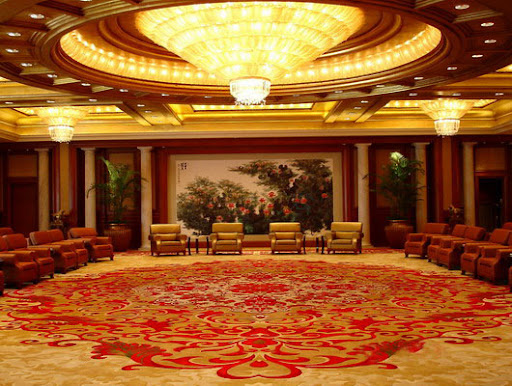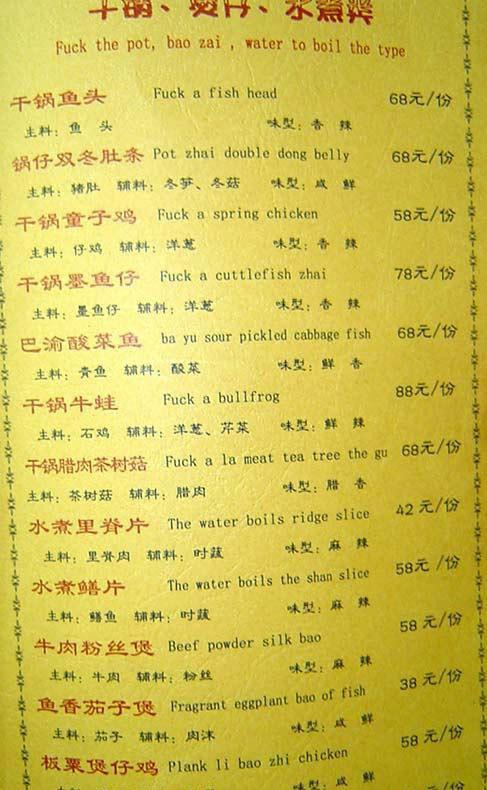Wendy and I found a great hotel, and we firmly believe it is the most under valued hotel in Shanghai – the Dongjiao State Guest Hotel. Let me tell you why we think the Most Under Valued Hotel in Shanghai is the Dongjiao State Guest Hotel.
It is Rarely Known
The construction of the Dongjiao State Guest Hotel started in 1995, and it took more than 10 years to grow the trees – just the trees. From unconfirmed sources, there are 3 trees in the garden that is more than 1000 years in age, and 1000 trees with more than 100 years. They are all moved from other provinces one by one. Everything was done mysteriously. Until it opened in one year ago, not many people really are aware about the existence of such a huge “garden”. Even after the open of the hotel one year ago, it is still under the radar screen. I thought it is a restricted area as many other state guest hotel. It turned out to be not so.
It is a State Guest Hotel
The hotel is actually a garden. It is not proper to say it is a royal garden, but it is built exactly the same way. There are all kinds of huge trees moved from the four nearby provinces and there are big lakes – many of them in the garden. The area is 1200 Mu in size, or 800,000.04 square meters. That is huge isn’t it? 80% of the garden is covered for forest – the newly built forest by moving old trees into it, and there are 100 Mu (66,666.67 m2) of water (lakes). Imagine that! It took a while to drive inside the garden. In such a big area, there are only 4 buildings.
The reason of this arrangement is because it is a state guest hotel. It means it is designed just for Guests of the State – state means the country, or the People’s Republic of China. There are many state guest hotel in Beijing, and many in Shanghai, like the Xijiao State Guest Hotel, or the Hong Qiao State Guest Hotel. The Dongjiao is newly built and by all means the largest and best one. It is the hotel if presidents or government visitors from other country stay.
What is Inside?
The reason why not many people know it is partly because of its position. It is at the interaction of Jinhai Road, and Longdong Ave, some where near Zhangjiang Hi Tech Park. From the Highway, it is covered by huge trees, and the Jinhai Road now is a dead-end road – the entrance of the hotel opens to this dead-end road. Not many people know the road, or discover the hotel.
If you drive a car and get into the hotel, you will completely be amazed. Be sure to have a car to go there. To walk from the entrance to the hotel buildings is just not feasible. The garden is huge.
Entering the entrance, you see a huge lake. Turning right and drive along the road, you winds your road along the lake side and then drive along the other lake on the right. There are many bridges, and you drive at least past 3 bridges before you see a building.
There are only 4 buildings (as I said) in the garden. The buildings are hidden behind the huge trees. Building #1 is the building for the state guests. Its security level is high, and I have no way to go near it. There are rumor that the building has under ground facility 9 meters under the ground to protect the guest from air attack, and some even say that is the reason it took 10 years to build this building. I completely have no idea and don’t think I can get access to this mysterious building. But from outside, its view is very like the Lincoln Memorial in Washington D.C. – with huge lake before it.
The building 2 is just for ceremony. It is good idea to hold wedding there. Their price for wedding package is 4888 RMB per table. Not bad in the current crazy wedding market. The building 3 is the only building that people can check-in.
There are 180 rooms in that building, and it opens to public. I am sure that when this hotel is fully functional, this building will be restricted only to government use, just like many other state guest hotels, but before that, you still have the chance to take a look.
The Architect
I like the architect of the three buildings – traditional Chinese architecture built in a modern way. Again, I suspect that the cost of the building must be extremely high, since the quality of the building seems super high.
The Room
The cheapest room in the hotel is 880 RMB per night if you book via CTRIP or 980 RMB at the reception. August is not the hot season so this is maybe the lowest rate all year round. I know it is by no means a cheap hotel, but it is definitely the best value I have every experienced in Beijing and Shanghai, not to mean other countries.
This is the photo of the room:

Credit: Dongjiao.net
The real feeling is just better than this already very good photo.
The other facility
The most interesting picture on its official website is this one:

Credit: Dongjiao.net
Look at this meeting room? Seems familiar? This is the typical meeting room leaders of the State meets with state guests. It should be somewhere in Building 2 (or maybe building 1).
Image in courtesy of Google Earthc
Above is the satellite image of the garden. You can see there are only three buildings on the north side of the garden, and the rest are all trees and lakes.
Practical Suggestions
If you can choose your hotel, choose this one. Give it a try. But do remember:
1. The location of the hotel is just for relaxing, and not for business. It takes several minutes for taxi to get to your building 3 even from the gate of the hotel. Imagine that. Also, wait for 30 minutes (I guess) for a taxi. It is far from Puxi, so it is best for having a vacation. If your home is in Shanghai, it is also a good idea to spend a weekend there in your special days, like your anniversaries.
2. It works best if you have a car. You have to take the shuttle to get from the building you stay to the gym.
3. The gym (swimming pool) is wonderful. Do spend your afternoon there.
4. Plan enough time just in the hotel – the hotel itself is a garden. It is not as big as the Centuary Park (0.8 million sq. meters v.s 1.4 million sq. meters), but the scenery is much better.
Hope you have a good time in this most under valued hotel in Shanghai.
P.S. Under-valued does mean it is a cheap hotel (let me emphasis it again). It means it is a hotel that its value is not proportional to its price or awareness.
P.S. 2. The question that is always in my mind when I visited the hotel was, where does the money to build this state hotel comes from? It is reported that the hotel (with 180 hotel rooms) was built at cost of 1 billion RMB. That is huge amount of money. I even doubt whether the report cost is the real cost if you really take a look at how luxurious the buildings and the gardens are. Now, the tax payers are more and more aware about where their money goes, aren’t they?

